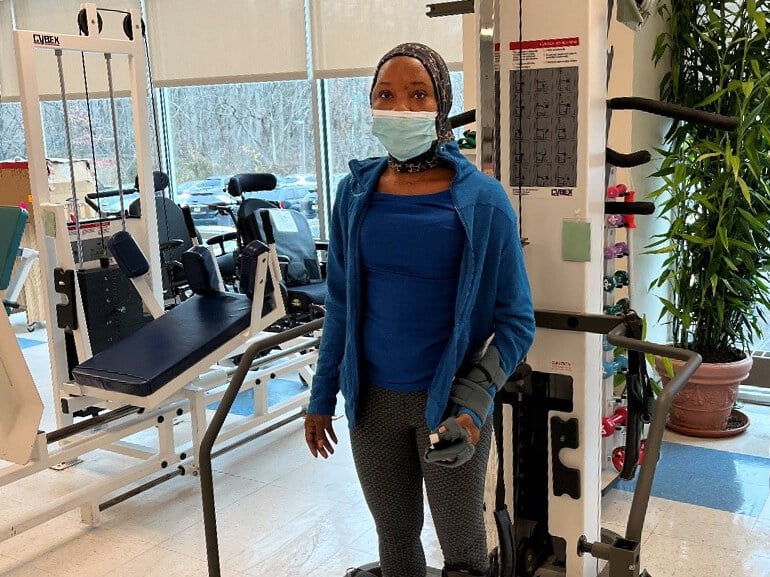Tiarra's story

Tiarra Fauntleroy’s fiancé died of a gunshot wound.
Four days later, she tried to take her own life.
“I lost my fiancé, went into a deep depression and I shot myself,” she said.
The 26-year-old collections specialist was rushed to the emergency room at Cooper University Hospital. Doctors were able to stabilize her, but the gunshot wound resulted in a traumatic brain injury, leaving Tiarra with impairments in neuromuscular strength and control, balance, range of motion and her cognitive abilities.
On admission to Kessler Institute for Rehabilitation – Marlton, Tiarra required assistance for all self-care activities such as bathing and dressing, and paresis left her unable to move or walk on her own. She was also depressed. “When I first came to Kessler I could not do much. I could only lift my left foot a little bit. I needed help with everything … I was worried and scared I wasn’t going to get better,” she said.
Tiarra’s physician-led team of experienced brain injury specialists, including nurses, physical and occupational therapists and other experts, optimized her recovery by tailoring a treatment plan to meet her specific needs and goals. Her goal was clear: “I just wanted to be able to get up and walk.”
The Penns Grove native participated in intensive physical and occupational therapy focused on improving her strength, balance and mobility. She used a weight-supportive treadmill to get her upright and strengthen her legs for walking. Electrical stimulation devices on her upper and lower body promoted increased strength and motor control. “I really liked the electrical stimulation they did on my arm and leg,” she shared. Tiarra progressed to the point of walking independently with a forearm crutch, navigating stairs and performing self-care activities on her own using adaptive strategies.
“I was scared to go home and not be able to do steps but my physical therapist taught me how to get up and down multiple flights to prepare me,” she said. Upon discharge, she was able to climb 12 steps with minimal assistance.
Tiarra praises her care team for her tremendous progress. “Therapy did a lot of work with me, I’ll never forget them … doing therapy brightened up my days. They made sure to use humor and put a smile on my face.”
She also participated in Kessler’s Safety Coach Program and the “Reconnecting After Brain Injury” educational series to prepare for a safe return home.
After a month at Kessler, Tiarra was discharged to home with her family and participated in outpatient therapy, where she worked on high-level balance and upper and lower body strength. “Inpatient got me up and walking and safe to go home. In outpatient, I’m building more strength and balance so I can get back to 100%,” she said.
“I’ve come a long way. Now I can do things myself,” she said. “This process has taught me that you need to have will power and that I have it in me. I’m thankful.”